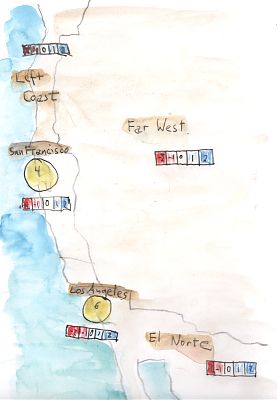20 October 25
Perceptual Crisis - The Board Game
 I am not a board game designer and the thoughts below do not constitute an intent to design such a game, but I am wondering what a board game about the current political situation in the United States might be like — let’s name the game for now Perpetual Crisis.
I am not a board game designer and the thoughts below do not constitute an intent to design such a game, but I am wondering what a board game about the current political situation in the United States might be like — let’s name the game for now Perpetual Crisis.
There are lots of board game antecedents to draw upon, even in the fairly limited space of United States political history. One example is This Guilty Land, designed by Amabel Holland, which is about the political struggle over slavery in the antebellum United States. One player’s role is “Justice”, and the other player’s role is “Oppression”. Another game of note is Votes For Women, which is about the campaign for women’s suffrage starting in 1848 and running until 1920 with the passage of the 19th Amendment. A much more tightly defined game is 1960: The Making of the President, about the presidential election of 1960 (Kennedy vs. Nixon).
Also of interest are COIN games (short for COunter-INsurgency), which are a series of simulation games covering asymmetrical conflicts such as insurgencies and often featuring up to four factions. (An example of a COIN game is Cuba Libre, about the 1956-1959 Cuban revolution, with four factions being the Batista government dictatorship, the syndicate aka the mob, the student protestors aka the Directorio, and the Fidel Castro-led guerillas.) A lot of the mechanics I’m imagining for Perpetual Crisis comes from COIN games.
I think Perpetual Crisis would be a two-player game though. One side would be those striving for a liberal multicultural democracy, the other side would be the white supremacist neo-feudalists. (I recognize that feudalism is a concept very much in disfavor with actual medievalists these days, but neo-feudalism does seem to capture both the rural power base of far-right farmland owners as well as the technofeudalism of the Silicon Valley types.) The sketch map shown at right for the board is very much inspired by COIN games. This would be an area control game with the areas being a combination of culture regions of the United States as well as major cities. (Here I am drawing from the 11 culture regions put forth by Colin Woodard in his book American Nations; the regions on the sketch map are the Left Coast, El Norte, and the Far West). Having major cities as separate areas to control in addition to the culture regions helps capture the rural-urban political split.
The horizontal five-box tracks on the sketch map hold a token to track the sentiment of each region or city. This ranges from +2 (strong democratic sentiment) to -2 (strong neo-feudalism). As players take actions in the game, the sentiment tokens will shift left and right on the tracks. I could also keep the COIN mechanism of players pulling cards from an event/action deck during each turn. Shuffled into the deck would also be cards representing special election turns, with the outcome of the election causing changes in the abilities of either side. The result of the election would depend in part on summing up the sentiment of the populations of both the culture regions and the major cities. (The numbers 6 and 4 on the sketch map indicate the population of Los Angeles and San Francisco respectively).
COIN games feature a quite asymmetric palette of actions to take depending upon the faction, and that works well in this framework. For instance Vote Suppression or Political Violence would be a couple of the actions the neo-feudalists could take, whereas the democracy side might have Rally or Get Out The Vote as two possible actions.
So what is happening right now in game terms? The neo-feudalists are carrying out Terror actions in Chicago and in Portland. I don’t think those actions are degrading democratic sentiment in either of those cities, but it may be strengthening neo-feudalist sentiment in other culture regions. The actions are also reducing capacity on a resource track, due to the negative economic impacts of deportations and suppressing immigration. Meanwhile, No Kings 2.0 could be represented by the play of a Nationwide Rally event card. This might increase democratic sentiment by a point in several regions or cities.
That is just a start in imagining this game. There is probably a place in the game for several resource tracks that work at a nationwide scale e.g. one tracking propaganda levels, another economic health, and another being quality of governance. So in each turn players could take actions that affect the nationwide resource tracks or those that impact specific regions or cities on the board.
Previous: The Artist's Way Next: Slippers
